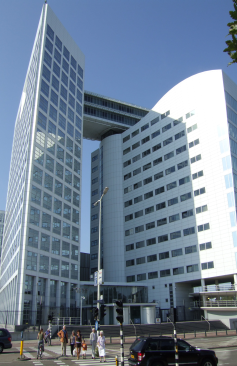Why Africa Should Not Withdraw From the International Criminal Court
By Joseph Kaifala
Published on February 17, 2016

Member states of the African Union have recently given their support to a Kenyan proposal for a push towards withdrawal from the International Criminal Court (ICC) based on claims that the court is unfairly targeting the continent. Africa forms the largest group of state parties to the Rome Statute, the ICC founding document.
Since the establishment of the court in 2002, only cases involving Africans have been brought to trial, which technically justifies African claims of bias.
How can a court established to dispense international criminal justice have only Africans in its docket when there are no shortages of war criminals, criminals against humanity, and génocidaires parading elsewhere? As long as this question is not answered, Africa’s claims of bias and unfairness in the dispensation of international justice will remain valid, but are they sufficient reasons to quit the court? Perhaps not.
The ICC does not operate as national courts do; the court was created as a court of last resort, which means, it will not take cases that are being investigated or prosecuted by national courts, unless the proceeding is unquestionably a sham. This principle, known as complementarity, is clearly established in Article (3) of the Rome Statute, which states that the court shall be complementary to national criminal jurisdiction. The principle of complementarity implies that the court reaches its highest success level when states carryout their obligations in cases over which the court may have jurisdiction. The basic intent is to prevent impunity for war crimes, crimes against humanity and genocide in places where the powerful arms of government might otherwise twist justice. Accused African criminals do not have to be at the court in The Hague if their countries can set up national tribunals to prosecute cases. In other words, when the Rome Statute succeeds, there shall be no cases at The Hague.
A major problem with the ICC is the referral and deferral provision of Article (16) of the Rome Statute, which politicizes and limits the court’s independence by granting the UN Security Council the power to refer or defer cases at the court. For instance, the Sudan situation was referred to the court by Security Council Resolution 1593 (2005) because Sudan is not a state party to the Rome Statute. In addition to other issues concerning the way in which the court pursues cases, placing a referral and deferral power in a political body with five permanent members holding veto powers is improper and runs against common notions of judicial neutrality and independence. For example, it took the Security Council no time to refer the Libya situation to the court, but Syria remains immune to the arms of international criminal justice. Scenarios like this make African leaders think the court was established to try only African crimes against humanity.
In all fairness, even amidst these structural problems, there are no cases before the court that do not deserve to be there. A few of the cases were referred by the governments concerned and others are Article (16) cases. The court’s failure to intervene in other regions is necessarily a denial of justice to victims of those regions and that should not become a reason to impede justice for African victims. When countries are either unable or unwilling to fulfill their obligations under the principle of complementarity, they relinquish jurisdiction to the court. The selectiveness of the court’s intervention is a structural problem that could be amended by state parties to the Rome Statute through constructive efforts rather than a continental decision to withdraw from a major international criminal justice mechanism.
African countries do not have to withdraw from the court to maintain their judicial sovereignty. The efforts applied towards condemning the court should be invested in strengthening national criminal jurisdictions and making use of the deference of the ICC to national courts. Additionally, the African Union could create a viable continental court with similar jurisdiction to the ICC and ensure its neutrality, independence, and functionality.
Currently, the African Union does not convince anyone of its capacity to prosecute crimes within the jurisdiction of the Rome Statute. The present African Union Chairman, Chadian president Idriss Déby, would recall that Senegal is still attempting to complete the Hissene Habre trial at the request of the African Union in a more than twenty-five year campaign to bring the former Chadian leader to justice. Habre is accused of ordering the killing of 40,000 people and torturing 200,000 individuals during his regime, which lasted from 1982-1990. The African Union has issued countless resolutions unsuccessfully calling on member states to fund this single case. It begs the question, where would Africa’s victims find justice in the likely event that their countries are unable or unwilling to prosecute violators, especially those shielded by national regimes? There must be a concrete and reliable answer to this question before the continent decides to ditch the ICC.
Africa should stay with the ICC and reform it so that it works for the continent. There are provisions in the Rome Statute that allow for collaboration between the court and member states in the application of international criminal justice. Moreover, while the court is at The Hague, nothing prevents it from sitting in member states or establishing hybrid tribunals involving the ICC and individual member states. Instead of quitting the ICC, Africa should continue to work towards a continental alternative that could do the work of the ICC in complementarity. However, any African tribunal cannot commence on the basis of sovereign or presidential immunity, which contravenes ICC jurisdiction over individuals of any rank, who commit the most serious crimes of international concern.
The Author

Joseph Kaifala is founder of the Jeneba Project Inc. and co-founder of the Sierra Leone Memory Project. He was born in Sierra Leone and spent his early childhood in Liberia and Guinea. He later moved to Norway where he studied for the International Baccalaureate (IB) at the Red Cross Nordic United World College before enrolling at Skidmore College in upstate New York. Joseph was an International Affairs & French Major, with a minor in Law & Society.
He holds a Master’s degree in International Relations from the Maxwell School at Syracuse University, a Diploma in Intercultural Encounters from the Helsinki Summer School, and a Certificate in Professional French administered by the French Chamber of Commerce.
Joseph was an Applied Human Rights Fellow at Vermont Law School, where he completed his JD and Certificate in International & Comparative Law. He is recipient of the Vermont Law School (SBA) Student Pro Bono Award, Skidmore College Palamountain Prose Award and Skidmore College Thoroughbred Award.
Joseph was a 2013 American Society of International Law Helton fellow. He served as Justice of the Arthur Chapter (Vermont Law School) of Phi Alpha Delta Law Fraternity International. He is a member of the Washington DC Bar.
Article picture: ICC building. Picture by Vincent van Zeijst. Source: Wikipedia


